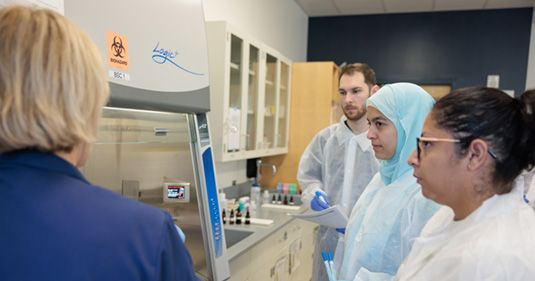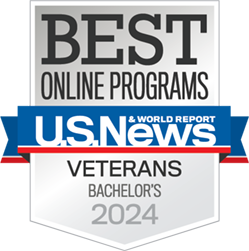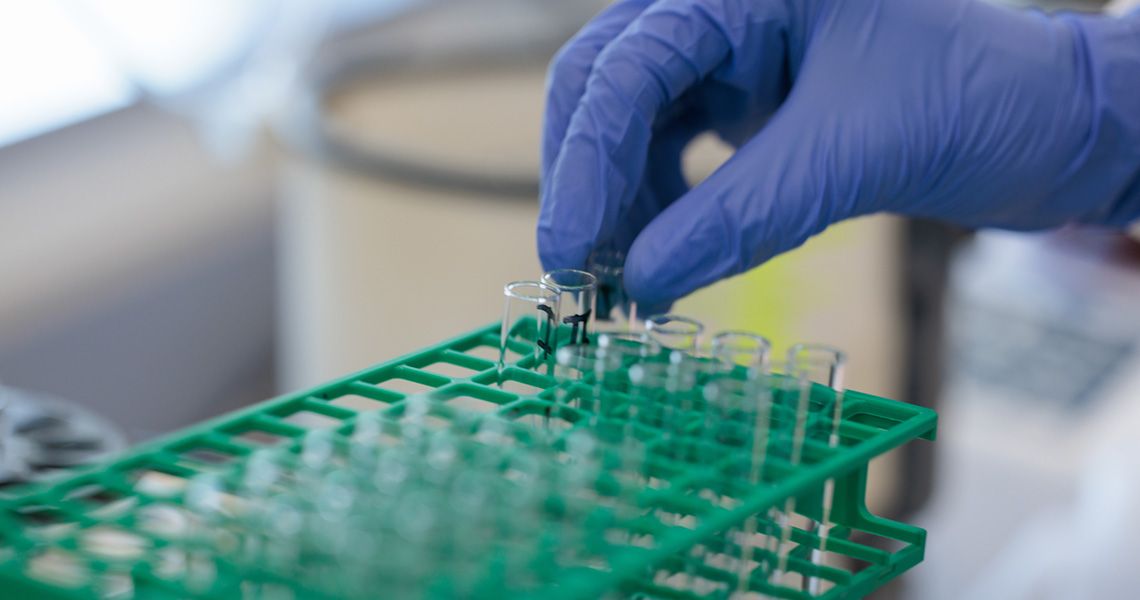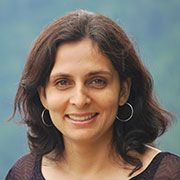
Take Your Next Step in Laboratory Science
100% Online
24 Months*
Earn your online Master of Science in Health Sciences (MSHS) in Biomedical Laboratory Science (BLS) degree from the George Washington University (GW). In this online master’s in biomedical laboratory science, students gain practical laboratory experience and focus on the research principles that allow them to accelerate their careers with confidence.
- Choose from three unique concentrations: translational microbiology, medical laboratory sciences, and immunohematology and biotechnology.
- Explore practical courses like Research Ethics and Scientific Integrity.
What makes us unique?
Our online master’s in biomedical laboratory science provides three specialized concentrations for students to choose from, depending on what career they are most interested in pursuing upon graduation. We are here to help our students succeed with robust student services and our program is fully online, so it works for any schedule.
To learn more about GW’s online master’s in biomedical laboratory science program, register for one of our upcoming events.
*The total number of credits and duration of the program depend on the number of transferred credits
Program Outcomes
and Skills Acquired
Students in this online master’s in biomedical laboratory science program will gain essential laboratory science knowledge that will help them succeed in the field—like advanced biomedical laboratory diagnostics and tools, biomedical research techniques, clinical trial methodologies, and more.
Request Information
* Indicates required field
- Read: Privacy Disclaimer Acknowledgment
-
By submitting your contact information, you are providing your express consent authorizing GW and GW's representatives to contact you by email, phone, or text (including the use of an automatic dialing system). Standard text messaging and/or data rates may apply.
If you do not provide your contact information (phone and email), we may not be able to provide you with the information you requested.
If you provided your contact information but no longer wish to receive phone calls, emails, or text (SMS) messages from GW, you will have the option to opt-out. Emails and Text messages will include details for unsubscribing/opting out. To opt out of receiving phone calls from GW, contact us via email at info [at] hsprograms [dot] gwu [dot] edu (info[at]hsprograms[dot]gwu[dot]edu) or text/ call: 202-792-2819.
By submitting your information via this form, you also confirm that you have read and understood the GW Statement of Privacy Practices.
Note that the consent requested above is not required for enrollment in GW's programs. If you do not consent to providing the information requested on this form, you may contact us via email at info [at] hsprograms [dot] gwu [dot] edu (info[at]hsprograms[dot]gwu[dot]edu) or text/ call: 202-792-2819.
Become a Leader in the Lab
GW’s online master’s in biomedical laboratory science prepares students to move into leadership, supervisory, management, or teaching positions in clinical or diagnostic labs, laboratory science academic programs, government agencies, biotech companies, public health labs, blood banks, and more.
With a non-clinical focus on advanced scientific principles, our online master’s in biomedical laboratory science helps students understand the skills necessary to run and manage laboratories. Courses are taught fully online, so students can learn from anywhere, and our asynchronous format makes it easy to fit classes into any schedule to put students ahead of the competition.
Accreditation and Rankings
- GW is accredited by the Middle States Commission on Higher Education
- #62 Best National University*
- #13 Best Online Bachelor's Programs*
- #7 Best Online Programs for Veterans*
* The U.S. News & World Report – 2024 Rankings


Even though all classes were online, the professors still found ways to connect with the students, as if I were attending an in-person class. Whether it be weekly video updates on what the plan was for the week to Blackboard collaboration sessions so we could ask questions, the professors made sure there were always opportunities to connect with them.
– Gina Folk, MSHS in Immunohematology and Biotechnology, ’20

Program Highlights
- Convenient, flexible online format
- Taught by expert faculty with valuable experience in the field
- Small class sizes
- 3 Unique concentrations to specialize your degree
Choose from Three Concentrations
With three unique concentrations to choose from, students can pursue the courses that are right for them and the career path they want to follow. Our concentrations give practical, real-world knowledge to help make future scientific leaders. The MSHS BLS program also offers a general track concentration so you can customize your degree by selecting a combination of electives that match your career interests.
Translational Microbiology
Interpret and design translational microbiological research, discover solutions to infectious disease-related health issues, and prepare for supervisory positions in diverse microbiology laboratory settings.
Medical Laboratory Sciences
Focus on strategic leadership practices, build an understanding of the intricacies of managing and leading a clinical laboratory, and engage in online education backed by real-world experience that focuses on analyzing, evaluating, and using research data effectively in a medical lab.
Immunohematology and Biotechnology
Gain the strategic leadership and practical research skills you need to lead within the blood banking or transfusion medicine fields and laboratory settings.
Learn the Skills to Advance Your Career
36 Credits 15-Week Term
The courses in GW's online master’s in biomedical laboratory science are taught by experienced faculty and designed to help students accelerate their careers. In this non-clinical program, students gain valuable laboratory skills through the expert instruction of a dedicated faculty. All courses are taught fully online and can be completed in an asynchronous format.
Courses include:
- Research Ethics and Scientific Integrity
- Current Topics in MLS
- Biostatistics for Clinical and Translational Research
- Leadership in Biomedical Sciences
Learn more about the important role of biomedical laboratory sciences in health care.
MSHS in Biomedical Laboratory Science Admissions Details
Transfer Up to 9 Credits 3.0 GPA
Apply now to join the online master’s in biomedical laboratory science program at GW. Here's what you'll need to get started:
| Degree | A baccalaureate degree from a regionally accredited institution and a 3.0 GPA on a 4 point scale |
| Transcripts | Official transcripts from all prior institutions |
| Other Requirements |
National certification as a Medical Laboratory Technician (MLT), Medical Technologist (MT), Clinical Laboratory Scientist (CLS), a Medical Laboratory Scientist (MLS) or Blood Banking Technologist/ Specialist, or Microbiology Technologist/Specialist. Other requirements include a statement of purpose, resume/CV, two letters of recommendation, and an $80 application fee. The application fee is waived for active-duty U.S. military, current GW students, degree-holding GW alumni, and current McNair Program Scholars. |
| Personal Statement | Applicants must include a 250–500 word essay describing your reasons for undertaking study at GW, your academic objectives, career goals, and related qualifications including collegiate, professional, and community activities relevant to your program of interest. Include any substantial accomplishments not already mentioned on the application form. |
| Online Application Form | Apply Now |
Tuition Details
The online master’s in biomedical laboratory science at GW consists of 36 credit hours. Please find the cost per credit hour and total estimated costs here.
Note: Tuition rates are subject to change and additional fees may vary by program.
What You’ll Learn
- Apply the scientific knowledge foundation to understand the principles and practices of a laboratory.
- Analyze the relevance of laboratory data in the clinical and research setting.
- Effectively communicate scientific concepts and literature in professional settings to advance knowledge of the discipline.
- Integrate basic ethical principles and cultural sensitivity in the professional laboratory setting.
Become a More Valuable Laboratory Professional with an Online MSHS
GW’s online master’s in biomedical laboratory science is designed to give students versatile degree options upon graduation. Graduates are prepared to go into leadership positions across a range of laboratory industries including biotech companies, public health labs, and more.
- The median annual wage for lab supervisors is $62,503.1
- About 2,000 openings for microbiologists are projected each year, on average, over the decade.2
Meet the Program Director

GW’s experienced faculty provide you with the rich, practical knowledge and support needed for you to succeed in the program and in your career.
Rohini Ganjoo, PhD
- Read Full Bio
-
Rohini Ganjoo has been an educator and researcher for more than 10 years. Ganjoo is a founding faculty member of the Post-Baccalaureate Pre-Medicine (PBPM) Program and is currently the program director for the Biomedical Laboratory Sciences (MSHS) Program in the Department of Biomedical Laboratory Sciences Department.
Dr. Ganjoo’s passion is student and curricular development. She developed the biology curriculum for the PBPM program and several graduate courses. Since joining the George Washington University (GW), she has mentored undergraduate and graduate students in education and clinical research. She is actively involved in GW committees and mentors faculty in conjunction with the university’s Teaching and Learning Center. Dr. Ganjoo has published her research in peer- reviewed journals. In addition to her experience in teaching and life sciences, Ganjoo previously served as operations director of Ziby Creations, a technology-driven services provider and was responsible for business development, support, and operational efficiency.
Online Study at The George Washington University
By enrolling in GW's online master’s in biomedical laboratory science program, students gain access to a team of supportive faculty and expert student services. Online study at GW includes:
- A flexible, asynchronous format
- An experienced and caring faculty
- 24/7 IT Support
- Full-time and part-time flexibility
Sources
Curriculum Details
36 TOTAL CREDITS REQUIRED
The MSHS in Biomedical Laboratory Science program (100% online) prepares students to be managers and leaders in various scientific laboratory careers. The 12 required courses and three unique concentrations in this program will set students up for success in an industry that makes important advancements every day.
All courses in this non-clinical program are taught fully online and in an asynchronous format.
A general track concentration is available for students who do not wish to select one of the three concentration options.
Core Courses
- MLS 6244 Research Ethics and Integrity (3)
-
Traditional and modern topics in research ethics and scientific integrity Students will learn to conduct unbiased peer-review, conduct research, and report on an independent case examinations, research misconduct or other ethical issues, and participate in oral scientific and ethical discussions.
- MLS 6245 Current Topics in MLS (3)
-
Exploration of findings within the medical laboratory science field. Current topics will be integrated into the development of a required project proposal for the capstone research project that the student will complete in the following semester.
- MLS 6246 Capstone Project (3)
-
Students apply the knowledge gained throughout the program to complete an independent, mentored project. A proposal for the capstone project will have been developed by the student as a component of the Current Topics in MLS course (MLS 6245) during the previous semester.
- HSCI 6263 Biostatistics for Clinical and Translational Research (3)
-
Basic concepts and methods of biostatistics applied to translational research. Topics include distributions, populations and sample selection, variables, interaction and confounding, hypothesis formulation, correlation, t-tests, ANOVA, regression, and chi.
- MLS 6159 Leadership in Biomedical Sciences (3)
-
Leadership characteristics and styles and assessment of their strengths and weaknesses. Applying effective leadership strategies and decision making in the biomedical sciences setting.
Immunohematology and Biotechnology Concentration
- MLS 6219 Molecular Biology (3)
-
This course will emphasize the molecular mechanisms of DNA replication, repair, transcription, translation and gene regulation in prokaryotic and eukaryotic cells.
- MLS 6213 Seminar in Immunohematology (2)
-
Federal, state, and international regulations that govern the blood bank industry; laboratory research related to blood products; new product and practice guidelines; legal, social, and ethical issues related to transfusion medicine.
- MLS 6141 Advanced Immunology and Serology (3)
-
This course covers the principles of the immune system and the clinical applications of immunology related to the diagnosis of human diseases. The first half of the course will focus on the components of the immune system and the various functions of each.
- MLS 6218 Genetics (3)
-
This course will cover hereditary and molecular genetics, with an emphasis on genomics and human diseases.
- MLS 6217 Medical Biotechnology (3)
-
A comprehensive overview of current molecular technologies and how they are used in modern medicine.
- Choose 7 Elective Credits
-
Choose 7 Elective Credits
Medical Laboratory Science Concentration
- MLS 6242 Molecular Pathology (3)
-
Investigation of human disease processes with an emphasis on the molecular and genetic mechanisms of disease. The goal of this class is to advance students’ understanding of how molecular, cellular and genetic approaches are used to investigate human diseases.
- MLS 6160 Data Analytics and Research Methods in Laboratory Medicine (3)
-
Basic methods and practices for conducting valid and ethical research in the clinical laboratory. Literature review, research populations and designs, research ethics, data management and analytics, and research publication. Prerequisites: HSCI 6263.
- MLS 6243 Education and Assessment in MLS (3)
-
A study of instructional design as applied to the education and training of MLS professionals; a project-oriented course in which students design, develop, and evaluate a set of MLS instructional materials and assessment tools.
- MLS 6132 Molecular Epidemiology (3)
-
The range of molecular and genetic techniques used and their applications in epidemiological investigations.
- MLS 6158 Advanced Laboratory Management and Operations (3)
-
An introduction to critical concepts of lab management, including leadership theory, management principles, human resource management, financial management, quality management, and laboratory operations. Prerequisites: HSCI 2100 and HSCI 2117; for HSCI 2100 an equivalent English course and for HSCI 2117 an equivalent college-level math course may be substituted at the instructor’s discretion.
- Choose 6 Elective Credits
-
Choose 6 Elective Credits
Translational Microbiology Concentration
- MLS 6141 Advanced Immunology and Serology (3)
-
This course is designed to provide the student with a systematic approach to the biology and epidemiology of human parasitic, fungal and viral diseases. The course will cover the symptomology, pathology, diagnostic procedures and treatment of the various parasites, fungi and viruses that infect humans. Other topics including disease causation and specimen collection/handling will be discussed.
- MLS 6132 Molecular Epidemiology (3)
-
The range of molecular and genetic techniques used and their applications in epidemiological investigations.
- MLS 6216 Microbial Pathogenesis (3)
-
A comprehensive overview of the molecular basis of diseases caused by microbial pathogens with a focus on model microbial systems to illustrate mechanisms of the human infectious disease process.
- MLS 6160 Data Analytics and Research Methods in Laboratory Medicine (3)
-
Basic methods and practices for conducting valid and ethical research in the clinical laboratory. Literature review, research populations and designs, research ethics, data management and analytics, and research publication. Prerequisites: HSCI 6263.
- MLS 6217 Medical Biotechnology (3)
-
A comprehensive overview of current molecular technologies and how they are used in modern medicine.
- Choose 6 Elective Credits
-
Choose 6 Elective Credits
General Track Concentration Electives
- General Track Concentration Electives (21)
-
Students can choose 21 credits from a list of elective options (between MLS and HSCI graduate courses) for the MSHS in Biomedical Laboratory Sciences major.
Key Dates
|
Summer 2025 |
Fall 2025 |
Spring 2026 |
|
| Application Deadline |
March 20, 2025 (Closed) |
July 20, 2025 (Open) |
November 19, 2025 (Open) |
Admissions Requirements
To be accepted to the MSHS in Biomedical Laboratory Science program (100% online), you must have:
| Degree and Minimum GPA | A baccalaureate degree from a regionally accredited institution and a 3.0 GPA on a 4 point scale |
| Transcripts | Official transcripts from every college and university attended. All non-U.S. transcripts (including those in English) must be evaluated by an accredited foreign credential agency. Please find the list of member organizations here: https://www.naces.org/members. |
| Official GMAT/GRE Score | Not required |
| Personal Statement | Applicants must include a 250–500 word essay describing your reasons for undertaking study at GW, your academic objectives, career goals, and related qualifications including collegiate, professional, and community activities relevant to your program of interest. Include any substantial accomplishments not already mentioned on the application form. |
| Additional Requirements |
National certification as a Medical Laboratory Technician (MLT), Medical Technologist (MT), Clinical Laboratory Scientist (CLS), a Medical Laboratory Scientist (MLS) or Blood Banking Technologist/ Specialist, or Microbiology Technologist/Specialist. Other requirements include a statement of purpose, resume/CV, two letters of recommendation, and an $80 application fee. The application fee is waived for active-duty U.S. military, current GW students, degree-holding GW alumni, and current McNair Program Scholars. |
Two Letters of Recommendation
Letters of recommendation should be from:
- Academic instructors who can strongly attest to your academic ability, and/or
- Individuals who served in a supervisory capacity for you, and who can strongly attest to your work ethic.
- The recommender cannot be from a family or friend.
Recommender will submit a letter via the application portal on letterhead with a signature and credentials/contact information via the application portal.
Transfer Credits
Up to nine credit hours can be transferred into this program.
International Students
Effective Fall 2025
International students should check with individual programs regarding eligibility for visa sponsorship. Generally, online and hybrid programs are not eligible for student visa sponsorship from GW. This would include transfer students from any other institution with an existing visa. To be considered for admission, there are required scores that you will need to meet. Score requirements may differ by school and program so check the admissions requirements for your program.
Applicants who have not completed a post-secondary degree from an institution where English is the sole language of instruction are required to submit TOEFL, IELTS, PTE Academic, or the Duolingo English Test scores to be considered for admission. The following are the minimum scores for admission consideration:
- TOEFL: 600 on paper based, 250 on computer-based, or 100 Internet-based,
- PTE: overall score of 68,
- IELTS: an overall band score of 7.0, with no individual band score below 6.0
- DET overall score of 120.
Undergraduate applicants who meet one of the following conditions may be considered for admission without submitting TOEFL, PTE or IELTS or DET scores:
- You have earned an associate’s degree or higher from an institution where English is the sole language of instruction
- You are a citizen of an English-speaking country
Scores may not be more than two years old. To ensure TOEFL scores are sent to GW, use institutional code 5246. An institutional code is not required to send IELTS or PTE scores to GW. DET scores must be submitted via the Duolingo English Test system directly to GW.
Based on the results of your English Proficiency exam results and your application, you may be required to take English for Academic Purposes (EAP) during your first year of study at GW. Please note that GW evaluates each application holistically so applicants may still be recommended for EAP even if they meet the requirements for exemption. Students placed in EAP courses should anticipate additional tuition expenses as well as possible extension of time needed to complete their degree programs.
Official transcripts from institutions outside the U.S. must be accompanied by an official transcript evaluation from an accredited independent evaluating agency. Please be sure you request a detailed evaluation that includes all course titles, credit hours, grades, U.S. degree equivalency, grade-point averages (GPA), and date of degree conferral (course by course evaluation). For a list of acceptable foreign credential evaluation services, please visit NACES.
Supporting documents not submitted online should be mailed to:
Mail: George Washington University
ATTN: Transcript Processing Center
1415 W 22nd St.
Suite 220
Oak Brook, IL 60523
Alternatively, official electronic transcripts can be sent to: transcripts [at] hsprograms [dot] gwu [dot] edu (transcripts[at]hsprograms[dot]gwu[dot]edu)